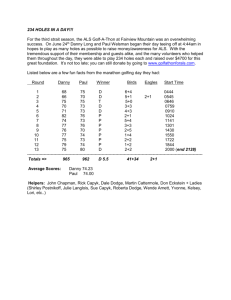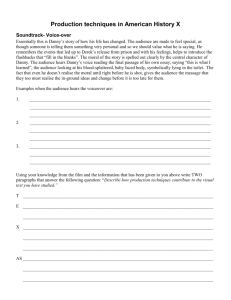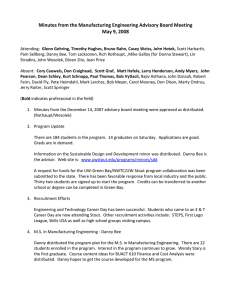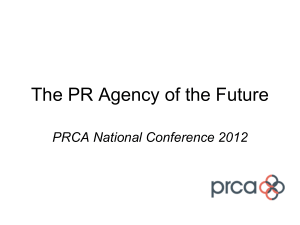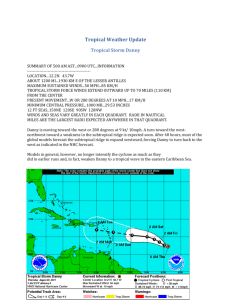AGRI 220 INTRODUCTION TO AGRIBUSINESS CONCEPTS Section 2 Knoblauch Hall 306
advertisement
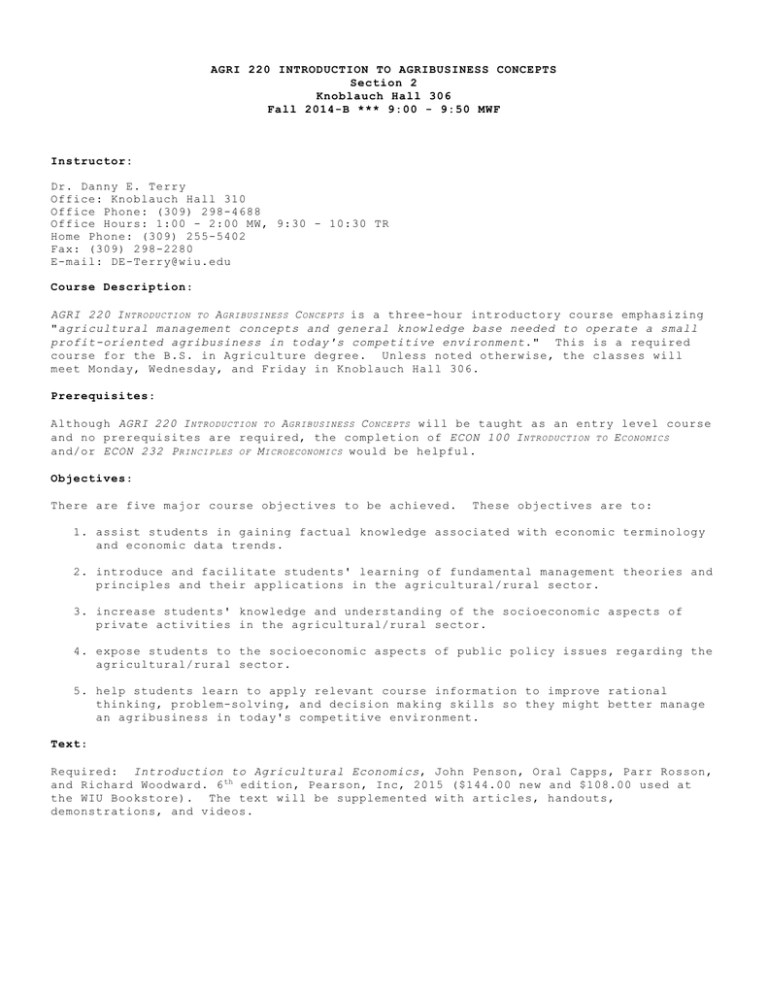
AGRI 220 INTRODUCTION TO AGRIBUSINESS CONCEPTS Section 2 Knoblauch Hall 306 Fall 2014-B *** 9:00 - 9:50 MWF Instructor: Dr. Danny E. Terry Office: Knoblauch Hall 310 Office Phone: (309) 298-4688 Office Hours: 1:00 - 2:00 MW, 9:30 - 10:30 TR Home Phone: (309) 255-5402 Fax: (309) 298-2280 E-mail: DE-Terry@wiu.edu Course Description: AGRI 220 I NTRODUCTION TO A GRIBUSINESS C ONCEPTS is a three-hour introductory course emphasizing "agricultural management concepts and general knowledge base needed to operate a small profit-oriented agribusiness in today's competitive environment." This is a required course for the B.S. in Agriculture degree. Unless noted otherwise, the classes will meet Monday, Wednesday, and Friday in Knoblauch Hall 306. Prerequisites: Although AGRI 220 I NTRODUCTION TO A GRIBUSINESS C ONCEPTS will be taught as an entry level course and no prerequisites are required, the completion of ECON 100 I NTRODUCTION TO E CONOMICS and/or ECON 232 P RINCIPLES OF M ICROECONOMICS would be helpful. Objectives: There are five major course objectives to be achieved. These objectives are to: 1. assist students in gaining factual knowledge associated with economic terminology and economic data trends. 2. introduce and facilitate students' learning of fundamental management theories and principles and their applications in the agricultural/rural sector. 3. increase students' knowledge and understanding of the socioeconomic aspects of private activities in the agricultural/rural sector. 4. expose students to the socioeconomic aspects of public policy issues regarding the agricultural/rural sector. 5. help students learn to apply relevant course information to improve rational thinking, problem-solving, and decision making skills so they might better manage an agribusiness in today's competitive environment. Text: Required: Introduction to Agricultural Economics, John Penson, Oral Capps, Parr Rosson, and Richard Woodward. 6 th edition, Pearson, Inc, 2015 ($144.00 new and $108.00 used at the WIU Bookstore). The text will be supplemented with articles, handouts, demonstrations, and videos. Basis for Student Evaluation: The course grade will be based on the following factors, with weights as indicated: Three Exams (each weighted at 15%)---------------- 45% Final Exam---------------------------------------- 25% Quizzes (6 of 8 -- each weighted at 5%)----------- 30% Total----------100% The final grading scale is based on the percentages shown below: A = 100-93 A- = 92-90 B+ = 89-87 B = 86-83 B- = 82-80 C+ = 79-77 C = 76-73 C- = 72-70 D+ = 69-67 D = 66-63 D- = 62-60 F = 59-0 There will be no "extra credit" assignments; however grades may be curved upward at the end of the semester (evaluated only after final numerical grades have been calculated). Exams: The exams (a combination of objective, short answer, and essay) will be over lectures, presentations, handouts, videos, and class discussions. The final exam will be weighted more than a regular exam. With the exception of the final, exams will not be comprehensive. However, the process of building upon previous work is necessary to understand new material. Under no circumstances will exams be given early; so, please don't ask. Makeup exams will be given only when absences are for reasons beyond your control. Past students have indicated that, in their opinion, makeup exams tend to be more difficult (the exams will certainly be different); therefore, please try to take the exam on the scheduled date. Note: Research shows that students working outside of class in small study groups of roughly four to six, do better academically than students working either alone or in large groups. Quizzes: There will be eight 5-10 minute unannounced quizzes during the semester (two for each section). Quizzes will cover the lecture material and reading assignments for the previous class periods in the section and the reading assignment for the day of the quiz. There will be no makeups on quizzes, but the two lowest quiz scores will be dropped. If you must miss a class period for reasons beyond your control and have informed Danny in advance, there will be no penalty for a missed quiz. Score Revisions: Occasionally a scoring mistake will be made -- professors are human, too. If you feel that you deserve more credit than you received, see Danny after class in his office. Come with a "perfect" answer in mind and he'll compare that to what you have written. If the score is too low, it will be raised immediately. Also, Danny is deeply impressed with the integrity of students who come to him to report that he made an addition error and/or gave too much credit. Participation: It is impossible for you to meet the course objectives unless you are present and participate in class. Students should report their absences BEFORE class begins. Please note that in order for an absence to be considered for "excused" approval, documentation should be provided (and then approved at Danny's discretion) before the class period missed. Providing documentation does not guarantee an absence will be approved/excused. Oftentimes there will be lecture and discussion sessions. Questions will be raised in class for response and discussion. You are encouraged to say what you think. Bring questions to class. You share the responsibility for getting the various viewpoints aired. Thus, regular attendance and timely arrival is expected. Plan not only to show up, but to write, to think, and to speak. Be prepared to challenge the basic premises of the class and the readings. A variety of perspectives and opinions will be strongly encouraged, along with vigorous (but civil) debate and argument. Teaching Philosophy of Danny Terry: The test of a good teacher is not how many questions he can ask his students that they will answer readily, but how many questions he inspires them to ask him which he finds it hard to answer. Alice Wellington Rollins Danny believes that a university system is comprised of a leadership team made up of a president, provost, vice presidents, college deans, chairpersons, faculty, and staff who are responsible for the coordinated effort of teaching/learning directed to the most important members of the university system -- the students. Danny's individual teaching style can best be described as open, informal, and one of active participation. As a teacher, his primary objective is to assist students in learning and ensure their abilities so that they can achieve their goals. He views himself as a facilitator of learning, and his students as clients (not customers). Danny tries not to emphasize memorization beyond what is necessary, but does try to provide leadership and encourage scholarship, knowledge, problem-solving, and application. Oftentimes the cause and effect flow in teaching/learning is reversed; often Danny learns from his students. He encourages them to ask "the difficult questions" of him and those around them. It is his policy to explain to the students that he makes mistakes (after all, professors are human too). Danny regularly asks for guidance and suggestions to improve his teaching skills, but more importantly to improve their ability to understand, learn, and apply. He strives for a relaxed classroom atmosphere where students can at any time ask questions or provide additional relevant comments. Danny feels that teachers must take personal and moral responsibilities for improving the intellectual environment, developing a global perspective in all facets, encourage strong leadership and support by challenging that leadership through appropriate means, and focus on presenting academic programs in a manner that is more interdisciplinary, intergenerational, intercultural, and international. Danny also feels that students must be prepared and willing to actively participate in such an environment. Office Hours: You are encouraged to visit Danny in his office. An appointment is not necessary if you plan to visit during Danny's office hours, but a call may save you some time. If you need to make an appointment, Danny usually carries his electronic calendar (schedule) with him. Please call if you are unable to keep your appointment. To make your visit more productive, plan to bring a list of specific questions or troublesome topics. If you have a specific question, you may call Danny at his office. You may also call him at his home in the evening, but only before 9:00 PM. If it is an absolute emergency, the time restriction is waived (remember -- your definition of an absolute emergency and Danny's definition might be different). Academic Integrity: It is felt that you are well aware of what actions violate the standards of academic honesty which have been established at this University. If you are not aware of what constitutes an academic violation, or not aware of regulations/policies, please refer to www.wiu.edu/policies/acintegrity.php on WIU’s webpage. It would be unfair to violators and to other students for Danny not to follow through with the disciplinary process which has been established when he is certain a violation has occurred. If caught cheating on an exam or plagiarizing others' work, Danny will follow-up with a written report to you explaining the situation as he views it, and the evidence he has pertaining to the event. After meeting with you, if Danny is still convinced that you were cheating (this includes plagiarism), you will be assigned a final grade of "F" for this course. A full disclosure of student rights and responsibilities can be found at www.wiu.edu/policies/acintegrity.php on WIU’s webpage. Americans with Disabilities Act (ADA): At Western, accommodations in the area of test and note-taking may be made for any student who notifies the instructor of the need for an accommodation. Any student with a documented disability, that needs classroom accommodations, e.g., academic or emergency evacuation, is requested to set up a meeting with Danny to discuss accommodations. It is imperative that you take the initiative to bring such needs to the attention of your instructors, as they are legally not permitted to inquire about such particular needs of students. For AGRI 220, if you feel you need special accommodations, please feel free to come and discuss this with Danny or contact Tara Buchannan (298-2512) at Disability Resource Center -- Memorial Hall 143. Expectations of Students: A few things to avoid in any college classes are : 1) carrying on personal conversations with others during lectures; 2) sending text messages or “surfing” on your cell phones during class; 3) allowing your cell phone to ring during class; 4) missing class and asking “Did I miss anything important?”; 5) placing your head on your desk or falling asleep during the lecture/class; 6) being excessively tardy; 7) failing to read assigned textbook or collateral material; 8) being absent on exam days; and 9) not bringing required materials to class. Thus, specifically for AGRI 220 (and many other courses), regular attendance (and timely arrival) is expected (just like showing up for work - and showing up on time is required if you want to keep your job). Notify Danny if you are going to be absent. Students should report their absences BEFORE class begins. Each person in the classroom is expected to treat everyone else as members of a scholarly community – provide useful critique and refrain from destructive or harassing commentary. Be professional and respectful. Turn off and put away your iPhone, Blackberry, Android, etc. when you arrive. DO NOT send text messages, check email, or browse the web during class – put your phone away and leave it there! If you need an exception to the phone policy due to medical or safety reasons, you should discuss this with Danny BEFORE class begins that day. Keep your arguments civil – classroom disruption will be seen as a disciplinary offense. These types of behaviors (as listed above) during class can lead to dismissal for the day. Two dismissals due to disruptive or unprofessional behavior will result in a permanent disbarment from the course and a final grade of “F” will be assigned – you may appeal this decision to the Council on Admission, Graduation and Academic Standards. Seating Chart: To help Danny to get to know you personally, you are asked to establish a regular seat within the first two or three class periods. Danny will put your names on a seating chart so that he might better and more quickly put names with faces. Food, Beverage, and Tobacco Policy: The use of tobacco is prohibited in Knoblauch Hall. Agricultural Education Majors: If you are majoring in Agricultural Education (or other education major), you are required to receive a grade of "C" or better in this course in order to meet State of Illinois certification requirements. With the current university +/- grading system, receiving a "C-" or below will require you to retake this course or find a substitute course to meet School of Agriculture graduation requirements. Important Dates: August 28 (R) - Football: WIU vs Valparaiso at 6:00 PM. August 29 (F) - Open registration ends. September 1 (M) - Labor Day –- classes dismissed. September 3 (W) - Activities and Volunteer Fair from 3:00 - 5:00 PM in the University Union Grand Ballroom (Volunteer Fair in Union Prairie Lounge). September 5-6 (F-Sa) - Macomb Balloon Rally. September 8 (M) - Last day to process a drop without being assessed tuition for your class(es)or receiving a “W” (withdrawal) grade; a full refund will be made of all tuition and mandatory fees for any student totally withdrawing from the University. September 10 (W) - Study Abroad Fair from 10:00 - 3:00 PM in the University Union Grand Ballroom. September 13 (Sa) - Football: WIU vs Drake at 3:00 PM. September 18 (R) - National Depression Screening Day in Memorial Hall 102 from 9:00 3:00 PM. October 1 (W) - Illinois archery deer season opens. October 4 (Sa) - Football: WIU vs North Dakota State (Homecoming) at 3:00 PM. October 7 (T) - All Major Career and Internship Fair from 10:00 - 2:00 PM in the University Union Ballroom. October 8 (W) - Ag Career Fair from 9:00 - 1:00 PM in the University Union Ballroom. October 10 (F) - Fall Break –- classes dismissed. October 18 (Sa) - Football: WIU vs Illinois State at 3:00 PM. October 21 (T) - Early warning grade notifications e-mailed to students. October 25 (Sa) - Football: WIU vs Northern Iowa at 1:00 PM. November 2 (Su) - Last day to drop a 16-week class. November 2 (Su) - Last day to make a total University withdrawal. November 3-21 - Advanced Registration for Spring 2015. November 21-23 (F-Su) - First Illinois deer season (firearms). November 22 (Sa) - Football: WIU vs Indiana State at 1:00 PM. November 24-28 (M-F) - Thanksgiving Break –- classes dismissed. December 4-7 (R-Su) - Second Illinois deer season (firearms). December 15-19 (M-F) - Final exam week. December 17 (W) - Final exam for the 9:00 AM section of AGRI 220 is 8:00 AM. December 23 (T) - Final grades available. OFFICE HOURS AND CLASS SCHEDULE Fall ‘14 Semester Name: Danny E. Terry M onday 8:00 -- 8:30 8:30 -- 9:00 9:00 -- 9:30 9:30 - 10:00 10:00 - 10:30 10:30 - 11:00 11:00 - 11:30 11:30 - 12:00 12:00 - 12:30 12:30 -- 1:00 1:00 -- 1:30 1:30 -- 2:00 2:00 -- 2:30 2:30 -- 3:00 3:00 -- 3:30 3:30 -- 4:00 4:00 -- 4:30 4:30 -- 5:00 5:00 -- 5:30 5:30 -- 6:00 Evening Office Phone: 309.298.4688 Tuesday W ednesday Cell Phone: 309.255.5402 Thursday Friday Prepare for Classes 333 Ag Marketing Prepare for Classes 333 Ag Marketing Prepare for Classes Prepare for Classes 333 Ag Marketing Prepare for Classes 333 Ag Marketing Prepare for Classes 220 Intro Agribus 333 Ag Marketing 220 Intro Agribus 333 Ag Marketing 220 Intro Agribus 220 Intro Agribus Office Hours 220 Intro Agribus Office Hours 220 Intro Agribus Prepare for Classes Office Hours Prepare for Classes Office Hours Prepare for Classes Prepare for Classes Prepare for Classes Prepare for Classes 120 Agri Society 120 Agri Society 120 Agri Society 120 Agri Society 120 Agri Society 120 Agri Society 120 Agri Society 120 Agri Society 120 Agri Society 120 Agri Society 120 Agri Society 120 Agri Society Office Hours Office Hours Office Hours Office Hours Course Outline: Below is the tentative schedule for AGRI 220 I NTRODUCTION any plan, one must be flexible. TO A GRIBUSINESS C ONCEPTS . Section I -- Introduction and Understanding Consumer Behavior August 25 August 27 August 29 September September September September September September September September September 1 3 5 8 10 12 15 17 19 (M) (W) (F) (M) (W) (F) (M) (W) (F) (M) (W) (F) – – – – – – – – – – – – Introduction to course; Chapter 1 - pages 1-12 Chapter 2 - pages 13-25 Chapter 2 - pages 25-36 Labor Day – No Classes Chapter 3 - pages 37-43 Chapter 3 - pages 43-50 Chapter 4 - pages 51-58 Chapter 4 - pages 58-63 Chapter 4 - pages 63-67 Chapter 5 - pages 69-75 Chapter 5 - pages 75-81 Chapter 5 - pages 81-84 September 22 (M) – EXAM #1 (Chapters 1 - 5) As with Section II -- Business Behavior and Market Equilibrium September 24 September 26 September 29 October 1 October 3 October 6 October 8 October 10 October 13 October 15 October 17 October 20 (W) (F) (M) (W) (F) (M) (W) (F) (M) (W) (F) (M) – – – – – – – – – – – – Chapter 6 - pages 85-93 Chapter 6 - pages 93-103 Chapter 7 - pages 105-119 Chapter 7 - pages 119-129 Chapter 8 - pages 131-138 Chapter 8 - pages 138-145 Agriculture Career Fair (meet in Union Grand Ballroom) Fall Break – No Classes Chapter 9 - pages 148-154 Chapter 9 - pages 154-160 Chapter 9 - pages 160-165 Chapter 9 - pages 165-172 October 22 (W) – EXAM #2 (Chapters 6 - 9) Section III -- Government in the Food and Fiber Industry October 24 October 27 October 29 October 31 November 3 November 5 November 7 November 10 (F) (M) (W) (F) (M) (W) (F) (M) – – – – – – – – Chapter Chapter Chapter Chapter Chapter Chapter Chapter Chapter 10 10 10 11 11 11 12 12 - pages pages pages pages pages pages pages pages 173-181 181-187 187-198 199-207 207-214 214-222 223-236 236-244 November 12 (W) – EXAM #3 (Chapters 10 - 12) Section IV -- International Agricultural Trade November November November November 14 17 19 21 (F) (M) (W) (F) – – – – Chapter Chapter Chapter Chapter November November November December December December December December December 24 26 28 1 3 5 8 10 12 (M) (W) (F) (M) (W) (F) (M) (W) (F) – – – - Thanksgiving Break - No Classes Thanksgiving Break - No Classes Thanksgiving Break - No Classes Chapter 17 - pages 345-352 Chapter 17 - pages 352-356 Chapter 18 - pages 357-370 Chapter 18 - pages 370-377 Chapter 18 - pages 377-384 Wrap-up and Evaluations December 17 16 16 16 16 - pages pages pages pages 315-320 320-325 325-336 336-343 (W) – EXAM #4 (Comprehensive Over Chapters 1 - 12; 16 - 18) 9/8/14 dt
